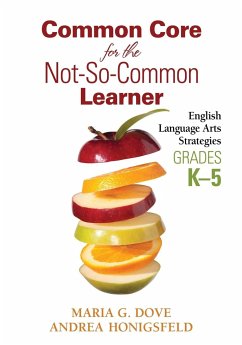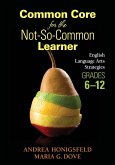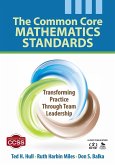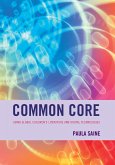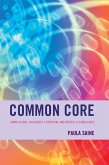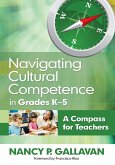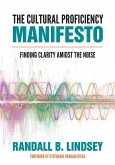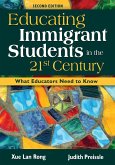Maria G. Dove, Andrea Honigsfeld
Common Core for the Not-So-Common Learner, Grades K-5
English Language Arts Strategies
Maria G. Dove, Andrea Honigsfeld
Common Core for the Not-So-Common Learner, Grades K-5
English Language Arts Strategies
- Broschiertes Buch
- Merkliste
- Auf die Merkliste
- Bewerten Bewerten
- Teilen
- Produkt teilen
- Produkterinnerung
- Produkterinnerung
The strategies you need to teach common standards to diverse learners Realistic and thorough, this teacher-friendly book shows how to help every student, including English Learners, students with disabilities, speakers
Andere Kunden interessierten sich auch für
![Common Core for the Not-So-Common Learner, Grades 6-12 Common Core for the Not-So-Common Learner, Grades 6-12]() Andrea HonigsfeldCommon Core for the Not-So-Common Learner, Grades 6-1229,99 €
Andrea HonigsfeldCommon Core for the Not-So-Common Learner, Grades 6-1229,99 €![The Common Core Mathematics Standards The Common Core Mathematics Standards]() Ted H. HullThe Common Core Mathematics Standards30,99 €
Ted H. HullThe Common Core Mathematics Standards30,99 €![Common Core Common Core]() Paula SaineCommon Core53,99 €
Paula SaineCommon Core53,99 €![Common Core Common Core]() Paula SaineCommon Core101,99 €
Paula SaineCommon Core101,99 €![Navigating Cultural Competence in Grades K-5 Navigating Cultural Competence in Grades K-5]() Nancy P. GallavanNavigating Cultural Competence in Grades K-535,99 €
Nancy P. GallavanNavigating Cultural Competence in Grades K-535,99 €![The Cultural Proficiency Manifesto The Cultural Proficiency Manifesto]() Randall B. LindseyThe Cultural Proficiency Manifesto20,99 €
Randall B. LindseyThe Cultural Proficiency Manifesto20,99 €![Educating Immigrant Students in the 21st Century Educating Immigrant Students in the 21st Century]() Xue Lan RongEducating Immigrant Students in the 21st Century39,99 €
Xue Lan RongEducating Immigrant Students in the 21st Century39,99 €-
-
-
The strategies you need to teach common standards to diverse learners Realistic and thorough, this teacher-friendly book shows how to help every student, including English Learners, students with disabilities, speakers
Produktdetails
- Produktdetails
- Verlag: Corwin
- Seitenzahl: 232
- Erscheinungstermin: 13. März 2013
- Englisch
- Abmessung: 254mm x 178mm x 13mm
- Gewicht: 445g
- ISBN-13: 9781452257822
- ISBN-10: 1452257825
- Artikelnr.: 36651506
- Herstellerkennzeichnung
- Libri GmbH
- Europaallee 1
- 36244 Bad Hersfeld
- gpsr@libri.de
- Verlag: Corwin
- Seitenzahl: 232
- Erscheinungstermin: 13. März 2013
- Englisch
- Abmessung: 254mm x 178mm x 13mm
- Gewicht: 445g
- ISBN-13: 9781452257822
- ISBN-10: 1452257825
- Artikelnr.: 36651506
- Herstellerkennzeichnung
- Libri GmbH
- Europaallee 1
- 36244 Bad Hersfeld
- gpsr@libri.de
Maria G. Dove, Ed.D, is currently a Professor in the School of Education and Human Services at Molloy College, Rockville Centre, New York. Prior to working in higher education, she spent over thirty years as an English-as-a-second-language teacher in public schools and adult English language programs. She is well-known for her professional development work across the United States, focusing on culturally and linguistically diverse students. Dove¿s work has led her to publish books, articles, and chapters on collaborative teaching practices and instructional strategies for English learners. In collaboration with Andrea Honigsfeld, she has co-authored four best-selling Corwin Press books including Collaboration for English Learners: A Foundational Guide to Integrated Practices (2019).
Preface
Acknowledgments
About the Authors
1. Introduction
Who Are Our Not So Common Learners?
The Standards Movement
Common Core Advances
Application of the Common Core to Address Individual Differences
Student Diversity and Teacher Challenges
What Is Not Covered in the Common Core Document
Focus on Research-Based Strategies to Address Learning Needs
2. Strategies for Academic Language Development
Why Diverse Learners Need Explicit Instruction in Academic Language?
Core Language and Vocabulary Strategies
Vocabulary Acquisition and Use
Knowledge and Application of Language
Conventions of Standard English
Anticipated Outcomes
Instructional Challenges
Promising Classroom Practices
Common Core Standards-(Un)Common Reflection Questions
Key Resources
3. Reading Strategies for Literature
Why Teaching Diverse Learners Reading Strategies Promotes Comprehension of
Literary Texts
Core Reading Strategies
Key Ideas and Details
Craft and Structure
Integration of Knowledge and Ideas
Range of Reading and Level of Text Complexity
Anticipated Outcomes
Instructional Challenges
Promising Classroom Practices
Common Core Standards-(Un)Common Reflection Questions
Key Resources
4. Reading Strategies for Informational Texts
Why Teaching Diverse Learners Reading Strategies Promotes Comprehension of
Informational Texts
Core Reading Strategies
Key Ideas and Details
Craft and Structure
Integration of Knowledge and Ideas
Range of Reading and Level of Text Complexity
Anticipated Outcomes
Instructional Challenges
Promising Classroom Practices
Common Core Standards-(Un)Common Reflection Questions
Key Resources
5. Reading Foundational Skills
Why Explicit Instruction in Basic Literacy Skills is Necessary?
Core Reading Strategies
Print Concepts
Phonological Awareness
Phonics and Word Recognition
Fluency
Anticipated Outcomes
Instructional Challenges
Promising Classroom Practices
Common Core Standards-(Un)Common Reflection Questions
Key Resources
6. Writing Strategies
Why Explicit Strategy Instruction Improves the Writing of Diverse Learners
Core Writing Strategies
Text Types and Purposes
Production and Distribution of Writing
Research to Build and Present Knowledge
Range of Writing
Anticipated Outcomes
Instructional Challenges
Promising Classroom Practices
Common Core Standards-(Un)Common Reflection Questions
Key Resources
7. Speaking and Listening Strategies
Why Speaking and Listening Skills Improve the Overall Academic
Development of Diverse Learners
Core Speaking and Listening Strategies
Comprehension and Collaboration
Presentation of Knowledge and Ideas
Anticipated Outcomes
Instructional Challenges
Promising Classroom Practices
Common Core Standards-(Un)Common Reflection Questions
Key Resources
8. Key to Successful Implementation: Collaborative Strategies
Why Collaborative Practices Help Meet the Common Core
Core Collaborative Strategies
Instructional
Curriculum Mapping and Alignment
Joint Instructional Planning
Parallel Teaching
Co-developing Instructional Materials
Collaborative Assessment
Co-teaching
Noninstructional
Joint Professional Development
Teacher Research
Joint Parent-Teacher Conferences and Report Card Writing
Planning, Facilitating, and Participating in Extracurricular Activities
Anticipated Outcomes
Challenges
Common Core Collaborations-(Un)Common Reflection Questions
Key Resources
References
Index
Acknowledgments
About the Authors
1. Introduction
Who Are Our Not So Common Learners?
The Standards Movement
Common Core Advances
Application of the Common Core to Address Individual Differences
Student Diversity and Teacher Challenges
What Is Not Covered in the Common Core Document
Focus on Research-Based Strategies to Address Learning Needs
2. Strategies for Academic Language Development
Why Diverse Learners Need Explicit Instruction in Academic Language?
Core Language and Vocabulary Strategies
Vocabulary Acquisition and Use
Knowledge and Application of Language
Conventions of Standard English
Anticipated Outcomes
Instructional Challenges
Promising Classroom Practices
Common Core Standards-(Un)Common Reflection Questions
Key Resources
3. Reading Strategies for Literature
Why Teaching Diverse Learners Reading Strategies Promotes Comprehension of
Literary Texts
Core Reading Strategies
Key Ideas and Details
Craft and Structure
Integration of Knowledge and Ideas
Range of Reading and Level of Text Complexity
Anticipated Outcomes
Instructional Challenges
Promising Classroom Practices
Common Core Standards-(Un)Common Reflection Questions
Key Resources
4. Reading Strategies for Informational Texts
Why Teaching Diverse Learners Reading Strategies Promotes Comprehension of
Informational Texts
Core Reading Strategies
Key Ideas and Details
Craft and Structure
Integration of Knowledge and Ideas
Range of Reading and Level of Text Complexity
Anticipated Outcomes
Instructional Challenges
Promising Classroom Practices
Common Core Standards-(Un)Common Reflection Questions
Key Resources
5. Reading Foundational Skills
Why Explicit Instruction in Basic Literacy Skills is Necessary?
Core Reading Strategies
Print Concepts
Phonological Awareness
Phonics and Word Recognition
Fluency
Anticipated Outcomes
Instructional Challenges
Promising Classroom Practices
Common Core Standards-(Un)Common Reflection Questions
Key Resources
6. Writing Strategies
Why Explicit Strategy Instruction Improves the Writing of Diverse Learners
Core Writing Strategies
Text Types and Purposes
Production and Distribution of Writing
Research to Build and Present Knowledge
Range of Writing
Anticipated Outcomes
Instructional Challenges
Promising Classroom Practices
Common Core Standards-(Un)Common Reflection Questions
Key Resources
7. Speaking and Listening Strategies
Why Speaking and Listening Skills Improve the Overall Academic
Development of Diverse Learners
Core Speaking and Listening Strategies
Comprehension and Collaboration
Presentation of Knowledge and Ideas
Anticipated Outcomes
Instructional Challenges
Promising Classroom Practices
Common Core Standards-(Un)Common Reflection Questions
Key Resources
8. Key to Successful Implementation: Collaborative Strategies
Why Collaborative Practices Help Meet the Common Core
Core Collaborative Strategies
Instructional
Curriculum Mapping and Alignment
Joint Instructional Planning
Parallel Teaching
Co-developing Instructional Materials
Collaborative Assessment
Co-teaching
Noninstructional
Joint Professional Development
Teacher Research
Joint Parent-Teacher Conferences and Report Card Writing
Planning, Facilitating, and Participating in Extracurricular Activities
Anticipated Outcomes
Challenges
Common Core Collaborations-(Un)Common Reflection Questions
Key Resources
References
Index
Preface
Acknowledgments
About the Authors
1. Introduction
Who Are Our Not So Common Learners?
The Standards Movement
Common Core Advances
Application of the Common Core to Address Individual Differences
Student Diversity and Teacher Challenges
What Is Not Covered in the Common Core Document
Focus on Research-Based Strategies to Address Learning Needs
2. Strategies for Academic Language Development
Why Diverse Learners Need Explicit Instruction in Academic Language?
Core Language and Vocabulary Strategies
Vocabulary Acquisition and Use
Knowledge and Application of Language
Conventions of Standard English
Anticipated Outcomes
Instructional Challenges
Promising Classroom Practices
Common Core Standards-(Un)Common Reflection Questions
Key Resources
3. Reading Strategies for Literature
Why Teaching Diverse Learners Reading Strategies Promotes Comprehension of
Literary Texts
Core Reading Strategies
Key Ideas and Details
Craft and Structure
Integration of Knowledge and Ideas
Range of Reading and Level of Text Complexity
Anticipated Outcomes
Instructional Challenges
Promising Classroom Practices
Common Core Standards-(Un)Common Reflection Questions
Key Resources
4. Reading Strategies for Informational Texts
Why Teaching Diverse Learners Reading Strategies Promotes Comprehension of
Informational Texts
Core Reading Strategies
Key Ideas and Details
Craft and Structure
Integration of Knowledge and Ideas
Range of Reading and Level of Text Complexity
Anticipated Outcomes
Instructional Challenges
Promising Classroom Practices
Common Core Standards-(Un)Common Reflection Questions
Key Resources
5. Reading Foundational Skills
Why Explicit Instruction in Basic Literacy Skills is Necessary?
Core Reading Strategies
Print Concepts
Phonological Awareness
Phonics and Word Recognition
Fluency
Anticipated Outcomes
Instructional Challenges
Promising Classroom Practices
Common Core Standards-(Un)Common Reflection Questions
Key Resources
6. Writing Strategies
Why Explicit Strategy Instruction Improves the Writing of Diverse Learners
Core Writing Strategies
Text Types and Purposes
Production and Distribution of Writing
Research to Build and Present Knowledge
Range of Writing
Anticipated Outcomes
Instructional Challenges
Promising Classroom Practices
Common Core Standards-(Un)Common Reflection Questions
Key Resources
7. Speaking and Listening Strategies
Why Speaking and Listening Skills Improve the Overall Academic
Development of Diverse Learners
Core Speaking and Listening Strategies
Comprehension and Collaboration
Presentation of Knowledge and Ideas
Anticipated Outcomes
Instructional Challenges
Promising Classroom Practices
Common Core Standards-(Un)Common Reflection Questions
Key Resources
8. Key to Successful Implementation: Collaborative Strategies
Why Collaborative Practices Help Meet the Common Core
Core Collaborative Strategies
Instructional
Curriculum Mapping and Alignment
Joint Instructional Planning
Parallel Teaching
Co-developing Instructional Materials
Collaborative Assessment
Co-teaching
Noninstructional
Joint Professional Development
Teacher Research
Joint Parent-Teacher Conferences and Report Card Writing
Planning, Facilitating, and Participating in Extracurricular Activities
Anticipated Outcomes
Challenges
Common Core Collaborations-(Un)Common Reflection Questions
Key Resources
References
Index
Acknowledgments
About the Authors
1. Introduction
Who Are Our Not So Common Learners?
The Standards Movement
Common Core Advances
Application of the Common Core to Address Individual Differences
Student Diversity and Teacher Challenges
What Is Not Covered in the Common Core Document
Focus on Research-Based Strategies to Address Learning Needs
2. Strategies for Academic Language Development
Why Diverse Learners Need Explicit Instruction in Academic Language?
Core Language and Vocabulary Strategies
Vocabulary Acquisition and Use
Knowledge and Application of Language
Conventions of Standard English
Anticipated Outcomes
Instructional Challenges
Promising Classroom Practices
Common Core Standards-(Un)Common Reflection Questions
Key Resources
3. Reading Strategies for Literature
Why Teaching Diverse Learners Reading Strategies Promotes Comprehension of
Literary Texts
Core Reading Strategies
Key Ideas and Details
Craft and Structure
Integration of Knowledge and Ideas
Range of Reading and Level of Text Complexity
Anticipated Outcomes
Instructional Challenges
Promising Classroom Practices
Common Core Standards-(Un)Common Reflection Questions
Key Resources
4. Reading Strategies for Informational Texts
Why Teaching Diverse Learners Reading Strategies Promotes Comprehension of
Informational Texts
Core Reading Strategies
Key Ideas and Details
Craft and Structure
Integration of Knowledge and Ideas
Range of Reading and Level of Text Complexity
Anticipated Outcomes
Instructional Challenges
Promising Classroom Practices
Common Core Standards-(Un)Common Reflection Questions
Key Resources
5. Reading Foundational Skills
Why Explicit Instruction in Basic Literacy Skills is Necessary?
Core Reading Strategies
Print Concepts
Phonological Awareness
Phonics and Word Recognition
Fluency
Anticipated Outcomes
Instructional Challenges
Promising Classroom Practices
Common Core Standards-(Un)Common Reflection Questions
Key Resources
6. Writing Strategies
Why Explicit Strategy Instruction Improves the Writing of Diverse Learners
Core Writing Strategies
Text Types and Purposes
Production and Distribution of Writing
Research to Build and Present Knowledge
Range of Writing
Anticipated Outcomes
Instructional Challenges
Promising Classroom Practices
Common Core Standards-(Un)Common Reflection Questions
Key Resources
7. Speaking and Listening Strategies
Why Speaking and Listening Skills Improve the Overall Academic
Development of Diverse Learners
Core Speaking and Listening Strategies
Comprehension and Collaboration
Presentation of Knowledge and Ideas
Anticipated Outcomes
Instructional Challenges
Promising Classroom Practices
Common Core Standards-(Un)Common Reflection Questions
Key Resources
8. Key to Successful Implementation: Collaborative Strategies
Why Collaborative Practices Help Meet the Common Core
Core Collaborative Strategies
Instructional
Curriculum Mapping and Alignment
Joint Instructional Planning
Parallel Teaching
Co-developing Instructional Materials
Collaborative Assessment
Co-teaching
Noninstructional
Joint Professional Development
Teacher Research
Joint Parent-Teacher Conferences and Report Card Writing
Planning, Facilitating, and Participating in Extracurricular Activities
Anticipated Outcomes
Challenges
Common Core Collaborations-(Un)Common Reflection Questions
Key Resources
References
Index

